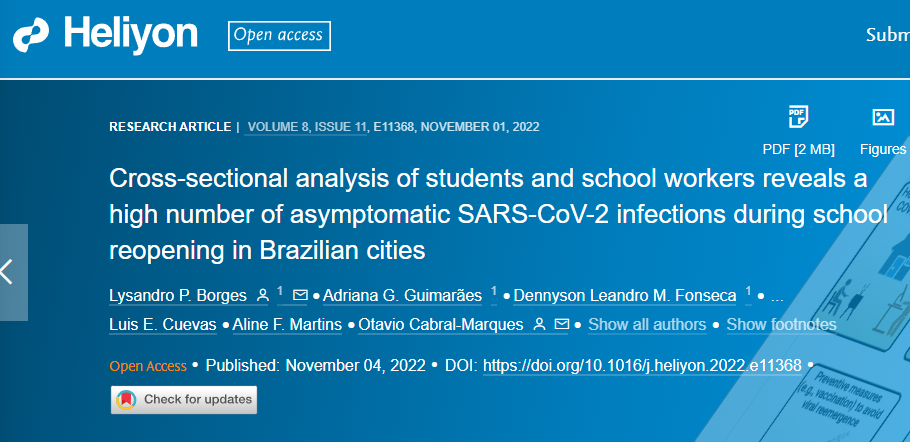Cross-sectional analysis of students and school workers reveals a high number of asymptomatic SARS-CoV-2 infections during school reopening in Brazilian cities
Brazil experienced one of the most prolonged periods of school closures, and reopening could have exposed students to high rates of SARS-CoV-2 infection. However, the infection status of students and school workers at the time of the reopening of schools located in Brazilian cities is unknown. Here we evaluated viral carriage by RT-PCR and seroprevalence of anti-SARS-CoV-2 antibodies (IgM and IgG) by immunochromatography in 2259 individuals (1139 students and 1120 school workers) from 28 schools in 28 Brazilian cities. We collected the samples within 30 days after public schools reopened and before the start of vaccination campaigns. Most students (n = 421) and school workers (n = 446) had active (qRT-PCR + IgM- IgG- or qRT-PCR + IgM + IgG-/+) SARS-CoV-2 infection. Regression analysis indicated a strong association between the infection status of students and school workers. Furthermore, while 45% (n = 515) of the students and 37% (n = 415) of the school workers were neither antigen nor antibody positive in laboratory tests, 16% of the participants (169 students and 193 school workers) were oligosymptomatic, including those reinfected. These individuals presented mild symptoms such as headache, sore throat, and cough. Notably, most of the individuals were asymptomatic (83.9%). These results indicate that many SARS-CoV-2 infections in Brazilian cities during school reopening were asymptomatic. Thus, our study highlights the need to promote a coordinated public health effort to guarantee a safe educational environment while avoiding exacerbating pre-existent social inequalities in Brazil, reducing social, mental, and economic losses for students, school workers, and their families.
Authors
Borges, Lysandro P; Guimari£es, Adriana G; Fonseca, Dennyson Leandro M; Freire, Paula P; Barreto, ikaro DC; Souza, Daniela RV; Gurgel, Ricardo Q; Lopes, Aline SA; de Rezende Neto, Jose Melquiades; Dos Santos, Kezia A;
External link
Publication Year
Publication Journal
Associeted Project
Digital Epidemiology
Lista de serviços
-
RASL11A, member of a novel small monomeric GTPase gene family, is down-regulated in prostate tumors.RASL11A, member of a novel small monomeric GTPase gene family, is down-regulated in prostate tumors.
-
Splice variants of TLE family genes and up-regulation of a TLE3 isoform in prostate tumors.Splice variants of TLE family genes and up-regulation of a TLE3 isoform in prostate tumors.
-
Concepts on Microarray Design for Genome and Transcriptome AnalysesConcepts on Microarray Design for Genome and Transcriptome Analyses
-
The iron stimulon of Xylella fastidiosa includes genes for type IV pilus and colicin V-like bacteriocins.The iron stimulon of Xylella fastidiosa includes genes for type IV pilus and colicin V-like bacteriocins.
-
Origins of the Xylella fastidiosa prophage-like regions and their impact in genome differentiation.Origins of the Xylella fastidiosa prophage-like regions and their impact in genome differentiation.
-
The role of prophage in plant-pathogenic bacteria.The role of prophage in plant-pathogenic bacteria.
-
Genetic control of immune response and susceptibility to infectious diseases.Genetic control of immune response and susceptibility to infectious diseases.
-
Building capacity for advances in tuberculosis research; proceedings of the third RePORT international meeting.Building capacity for advances in tuberculosis research; proceedings of the third RePORT international meeting.
-
São Paulo School of Advanced Sciences on Vaccines: an overview.São Paulo School of Advanced Sciences on Vaccines: an overview.
-
A reasonable request for true data sharing.A reasonable request for true data sharing.

